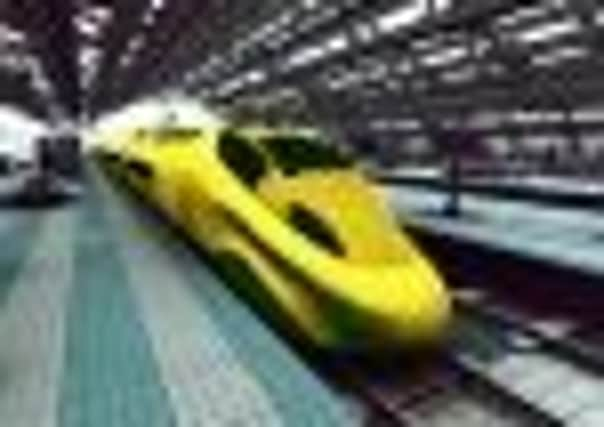Jonathan Reed: Minister must defy Nimbys and stay on track for North’s crucial high speed rail route


Over the course of a couple of hours, a steady stream of MPs appeared before her to give their views on the project which it set to dominate her time in office – plans for a £32bn high-speed rail network which will take 20 years to build and link London, Birmingham, Yorkshire and Manchester.
Since taking up the job barely a month earlier, she will have been fully aware of the contentious nature of the project already – few other consultations can claim to have attracted 55,000 responses. And by the time she walked out of the historic room – home to meetings of the Tory 1922 committee – she will have been in no doubt of the political battle that lies ahead.
Advertisement
Hide AdAdvertisement
Hide AdWhile a string of MPs from Yorkshire and the rest of the North made clear their backing for the scheme, there were sufficient dissenting voices – mostly from those along the line of the first phase of the route, from London to Birmingham – to expose the steel the Government will need to show if it is to push ahead with the scheme.
And it’s not only backbenchers who are expressing concern. Welsh Secretary Cheryl Gillan, whose Chilterns seat will have the line cutting through an attractive area of countryside – has made little secret of her opposition and sent Ms Greening written evidence saying the current scheme “does nothing but bring enormous damage to my constituency”. Government whip Michael Fabricant spoke at the meeting to call for a re-think on the route.
The vociferous nature of the opposition to the scheme has led some in Westminster to wonder whether it will ever happen. Critics offer environmental and economic reasons for opposing the project and were given fresh hope that they may kill off the project – known as High Speed Two (HS2) – when Ms Greening’s predecessor Philip Hammond, a passionate advocate who had labelled opponents as Nimbys, was called on to take Liam Fox’s role as Defence Secretary.
Opponents scent blood, and Ms Greening has struck a much more conciliatory note since her arrival, fueling questions over just how ready for a fight over the scheme she is. On her first appearance at the Transport Select Committee, days after taking up her new post, she said it was “impossible not to see the benefits” high-speed rail projects can bring but stressed she would take “great care” in looking at the decision and acknowledged “big debates” on both side of the argument. Weeks later in Committee Room 14 she told MP she was in “listening mode”.
Advertisement
Hide AdAdvertisement
Hide AdNow the Department for Transport (DfT) has put back a formal decision on whether to go ahead with HS2 from this month to January and is reportedly looking at spending £500m on extra tunneling, which could appease some of the critics – notably Ms Gillan, whose constituency would benefit – but which will also serve to prompt further demands for costly concessions.
There are enough warning signs for supporters of the route to feel a few nerves – not least given the propensity for performing a U-turn the coalition Government has shown in its first 18 months. But turning back now would be a monumental mistake and one for which the coalition may find it is never forgiven by voters and businesses in regions like Yorkshire and the North West which are in line to benefit.
Tony Blair once said “we’re at our best when we’re at our boldest” and the coalition should adopt the same spirit. Approving this scheme gives the Government the chance to fundamentally change the economic geography of the UK, and while every effort should be taken to squeeze maximum value for money and minimal environmental impact, Ministers must also stand up and say the national interest cannot be ignored. Criticism of the business case and passenger projections ignores the fact that no transport scheme can be built with complete certainty about its economic future.
Supporters of the scheme acknowledge that it was wrong in the months after the plans were first unveiled to cite speed as the main justification for the project. Saving 20 minutes from London to Birmingham is hard to justify when the price tag is so high, and played into critics’ hands. But now the message is far more compelling – with both West and East coast main lines nearing capacity, new lines need to be built, and if you’re building a new line anyway it costs only marginally more to make it high-speed, with all the benefits that come from saving 45 minutes on a journey from London to Leeds.
Advertisement
Hide AdAdvertisement
Hide AdCritics point to the eye-watering cost at a time of economic hardship, but the expected £2bn-a-year contribution from the DfT is the same amount the department currently pays for the Crossrail line from east to west London, and that is due to be complete just as HS2 begins to call on the cash – leaving as much in the DfT budget for other vital transport projects as there is currently. And research suggests faster links could be worth billions of pounds to the economy, as well as creating thousands of much-needed jobs as construction takes place.
If changes to the route will improve the project, then they should be made. But this is no time for the Government to go weak – and neither must alterations lead to any delay on an already long-term project. As Ms Greening reflects on the views of MPs and interest groups over Christmas, she must brace for the battle ahead and push ahead with high-speed rail.